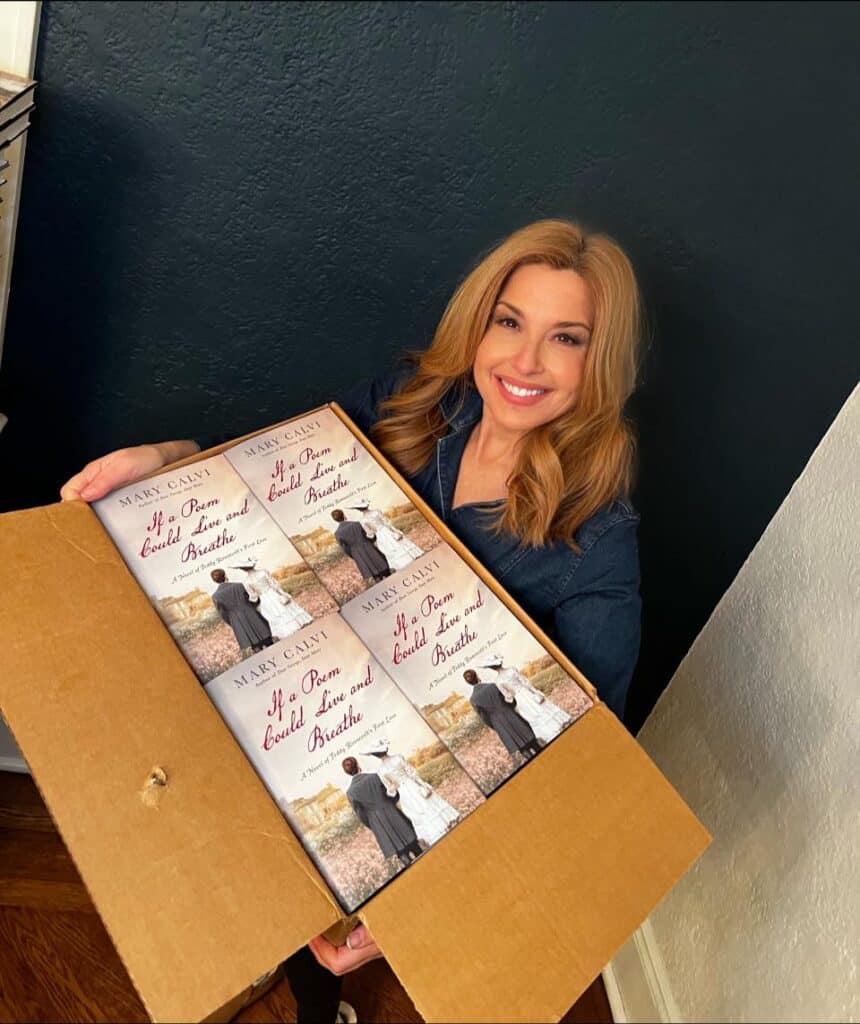
In 2019, Mary Calvi, morning anchor for WCBS-TV and the First Lady of Yonkers, penned Dear George, Dear Mary: A Novel of George Washington’s First Love. The book’s success, which included being turned into a made for TV documentary by the Smithsonian channel, included references to her home in Yonkers, and one of the oldest buildings in New York State, Philipse Manor Hall.
Through extensive research, Calvi wondered whether George Washington’s heart belonged not to Martha, but to his first love, Mary Philipse.
Now, in her second work of historical fiction, If A Poem Could Live and Breathe, Calvi again questions the traditional narrative of Presidential history. Using her journalistic skills to uncover the previously unpublished love letters written between Theodore Roosevelt and first wife, Alice Lee, Calvi provides a new understanding of their romance and ill-fated marriage. (Lee died post-childbirth at the young age of 22).
The love letters, long thought to have been destroyed, allowed Calvi to illustrate how Lee, a woman many historians wrote off as unimportant to the development of Roosevelt, did indeed help shape him into the man and future president he would become.
History has dismissed Alice Lee, possibly because of how biographers portrayed her and her relationship with Theodore. Edmund Morris, in his Pulitzer prize-winning biography of Roosevelt, wrote “… all love-letters between himself and Alice–with four trivial exceptions–were destroyed. Photographs of Alice were torn out of their paper frames.”
But Calvi discovered nearly 40 love letters and never-before-published photographs between Roosevelt and Lee, donated to Harvard University by Alice Lee’s great grand-daughter in 1990. Calvi included 36 of the letters in If A Poem Could Live and Breathe.
During her research at Harvard, Calvi writes in the book, “After reading through the last of the letters, I decided it might be a good idea to take a photograph with them while seated at one of a number of long wooden tables inside Houghton Library at Harvard University where they are stored. As I did, I was taken aback by what was hanging on the wall behind me: a portrait of President Roosevelt. Maybe he wanted them to be seen.”
Calvi meticulously transcribed each letter and donated those transcriptions to Harvard University for future researchers. The book, and the love letters show that Theodore fell madly in love with Alice, won her heart, and married her. So why, after her tragic death, did Theodore never say her name again? This is the question Calvi attempted to answer with this book, and relishes in portraying Alice Lee in a new light.
Calvi’s publisher St. Martin’s Press will release the book on Valentine’s Day, February 14, for print and for kindle and audible. On February 17, Calvi will discuss her book at the Yonkers Riverfront Library Auditorium. Doors will open for “An Evening with Mary Calvi” at 6:15 p.m. and will include a presentation, followed by Q & A and book signing. Copies of her book will be available onsite for purchase, through a partnership with Womrath Bookshop. The public is invited to attend this free literary event, but registration is strongly encouraged, particularly for those wishing to purchase a book onsite.
This event is sponsored by the Foundation for the Yonkers Public Library. “We’re delighted to have Mary share her new work with the people of Yonkers,” said Nancy Maron, President of the Foundation, “People of all ages will love hearing about her passion and skill for uncovering stories that others have missed. And helping people seek out information is one of the greatest strengths of a library.”
Copies of primary source materials, including many of the love letters, will be on display at the event. “We’re excited to have Mary return to Yonkers Public Library to discuss If A Poem Could Live and Breathe,” said Jesse Montero, library director, “This will be our biggest in-person author talk since the pandemic began, and there’s a real hunger for these events.”
Publishers Weekly has already lauded it as a “solid presidential love story” with a “magnetic narrative.”
Yonkers Historian Mary Hoar read the book and said, “Mary Calvi’s second novel is an amazing trip back, not only to late Nineteenth Century America, but also to the world of the innocence and romance of the first love of Theodore Roosevelt and Alice Hathaway Lee.
“Using primary sources, Ms. Calvi once again has brought powerful, historic characters to life, wrapped in impeccably researched history. She uses their own words to weave a tale of two young people meant to be together, sensitively writing of their discovery of each other, their journey to love, happiness and the anguish of loss.
“Theodore Roosevelt was a passionate man, a man of action enlightened by the beautiful, intelligent, passionate and gentle soul of his first love, Alice, a woman who sought to break the bonds restraining nineteenth century women, gently shaped Roosevelt’s personal and political philosophies, forever changed by great love and tragedy,” said Hoar.





